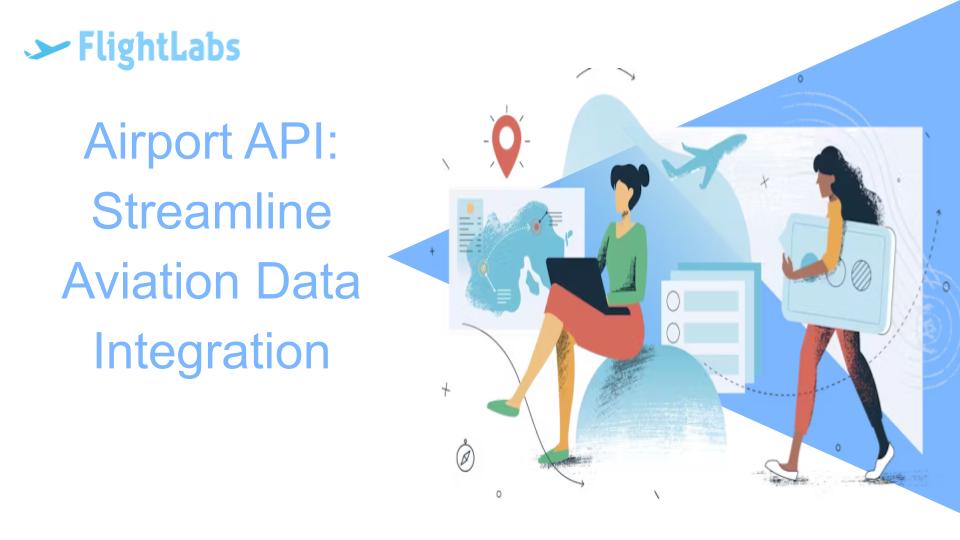Airport API: Streamline Aviation Data Integration

The aviation industry relies heavily on efficient data integration to ensure smooth operations, enhance passenger experiences, and drive innovation. Airport APIs play a pivotal role in this landscape by streamlining the integration of aviation data into applications, enabling developers to create robust solutions that cater to the diverse needs of the industry. In this blog post, we'll explore how Airport APIs streamline aviation data integration and facilitate the development of innovative solutions.
Unified Data Access:
One of the primary benefits of using an Airport API is unified data access. Instead of navigating through multiple data sources, developers can access a wide range of aviation data, including flight schedules, airport facilities, weather conditions, air traffic, and more, through a single API. This unified approach simplifies data retrieval and ensures consistency across applications, leading to more efficient development processes.
Real-Time Updates:
Airport APIs provide real-time updates on critical aviation information, such as flight statuses, delays, gate assignments, and baggage details. Developers can integrate these real-time updates into their applications to keep users informed and up-to-date. Whether it's passengers checking their flight status or airlines managing their schedules, real-time updates enhance operational efficiency and improve the overall user experience.
Customizable Features:
Airport APIs often come with customizable features that allow developers to tailor the API's functionality to their specific needs. Developers can customize data endpoints, parameters, response formats, and authentication methods, making it easier to integrate data into their applications seamlessly. This flexibility empowers developers to create highly customized solutions that meet the unique requirements of their projects.

Integration with FlightLabs
FlightLabs integrates seamlessly with booking systems, allowing developers to automate flight bookings, retrieve pricing information, and confirm reservations in real time. This integration streamlines the booking process for users, reduces manual errors, and enhances overall efficiency. Whether it's booking flights, managing reservations, or accessing pricing data, integration with booking systems simplifies the user experience.
Enhanced User Experience:
By leveraging FlightLabs, developers can create applications that offer an enhanced user experience for travelers, airlines, and airport personnel. Applications can provide users with intuitive interfaces, real-time updates, personalized notifications, interactive maps, and seamless booking experiences. These features enhance user satisfaction, improve engagement, and foster loyalty among users.
Data Analytics and Insights:
FlightLabs offers advanced data analytics and insights capabilities, allowing developers to analyze trends, track performance metrics, and derive actionable insights from aviation data. Developers can use analytics tools, machine learning algorithms, and predictive modeling to optimize operations, forecast demand, and make data-driven decisions. These insights drive innovation, improve efficiency, and enhance decision-making processes.
Security and Compliance:
FlightLabs prioritizes security and compliance by implementing robust authentication mechanisms, data encryption, access controls, and compliance with industry standards and regulations. Developers can integrate data into their applications securely, protect sensitive information, and ensure data privacy for users. Compliance with security best practices and regulatory requirements instills trust among users and stakeholders.
Scalability and Performance:
FlightLabs is designed to be scalable and performant, capable of handling large volumes of data requests, user interactions, and concurrent users. Whether an application serves a few users or millions of users worldwide, Airport APIs can scale to meet demand without compromising performance. This scalability ensures that applications remain responsive, reliable, and efficient under varying workload conditions.

Conclusion:
In conclusion, FlightLabs streamline aviation data integration by providing unified data access, real-time updates, customizable features, integration with booking systems, enhanced user experiences, data analytics capabilities, security, compliance, scalability, and performance. These APIs empower developers to create innovative solutions that drive efficiency, improve user experiences, and unlock new opportunities in the aviation industry. Embracing Airport APIs is essential for developers looking to build robust applications that cater to the evolving needs of the aviation ecosystem.